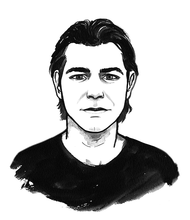“Every concept arises from the equation of unequal things.”
This statement by the hammer-wielding philosopher has been running through the back of my mind for a while – sometimes putting things reassuringly into perspective, more often constituting a despairing conclusion.
It’s from Friedrich Nietzsche’s 1873 essay “On Truth and Lies in a Nonmoral Sense” and is part of a discussion of how language misleads us. Not only do we blithely overgeneralize in making judgments about the world; worse, the words we use to do so are themselves grotesque generalizations about the world they profess to describe.
“No leaf ever wholly equals another, and the concept ‘leaf’ is formed through an arbitrary abstraction from these individual differences, through forgetting the distinctions,” Nietzsche writes, after observing: “Every word [...] must at the same time fit innumerable, more or less similar – which means, strictly speaking, never equal – cases.”
In other words, every concept is created through the equation of unequal things.
Describing the world is a form of lying
Once you’ve absorbed the implications of this fact, it’s almost impossible to keep looking at the world in the same way. You suddenly realize the inadequacy of our ways of seeing, describing, evaluating and judging that world. Language fosters the illusion that we can verbally express reality with a reasonable degree of accuracy and truth. In fact, describing anything at all is like attempting to copy Vincent van Gogh’s sunflowers with a paint roller – far from precise.
We simply can’t assign every difference a word of its own without rendering the world incomprehensible
It’s sobering to realize we do this, but even more so to see that it’s impossible to avoid. Language is necessarily a generalization, a model that causes the irretrievable loss of unique details; it would lose its function otherwise. We simply can’t assign every difference a word of its own without rendering the world incomprehensible. Imagine if you had to give every single tree a different name – you’d never finish.
Of course, you can divide trees into groups (“deciduous”), and groups into types (“oak”), and types into subtypes (“English oak”), but ultimately, you’ll have to “equate unequal things.” We have to generalize – and to generalize unfairly, in the main. Or as Nietzsche put it with such beautiful bombast, we have to “lie according to a fixed convention.”
Who are we kidding?
In most cases this isn’t such a bad thing. No one’s going to blame you for lumping together all the trees or all the leaves. It only becomes a problem once you realize we routinely do the same with people.
Muslims.
Immigrants.
Liberals.
Trumpeters.
Consider this from a Nietzschean standpoint and you think: Who are we kidding? How arrogant do you have to be to think you can sum up a billion members of a world religion, tens of millions of your own compatriots, millions of people who vote in a particular way, or tens of thousands of people who happen to think a populist billionaire should be president, in any meaningful way using a single word?
Yet this, too, is unavoidable. It serves a purpose. And – not insignificantly – it isn’t entirely inaccurate. People, besides being individuals, are also social creatures. Group identity is real. So is herd behavior.
After all, what do Shaquille O’Neal, Dr. Oz, Busta Rhymes, and Osama bin Laden have in common?
But the ease with which we take to the paint roller to represent each other, while acting as if we’re using a fine-tipped brush, can undeniably cause harm.
Look at what is arguably the most frequently used generalization of the past decade: Muslim. The word is used so matter-of-factly, you could almost forget how absurdly reductive the term itself is.
After all, what do retired NBA star Shaquille O’Neal, TV personality Dr. Mehmet Oz, rapper Busta Rhymes, soccer player Frank Ribéry, YouTube founder Jawed Karim, BBC news anchor Mishal Husain, and former Al Qaeda leader Osama bin Laden have in common other than the designation “Muslim”?
Every concept is created through the equation of completely unequal things.
Know thyself before you condemn the other
And that’s only the beginning. Because out of these Nietzschean generalizations we call words, we create sentences, and those sentences ultimately constitute the judgments we use to divide the world into good and bad. And we continue to repeat these judgments until they “seem firm, canonical and obligatory,” as Nietzsche puts it – until they have become “illusions about which one has forgotten that this is what they are.”
“Most terrorists are Muslim.”
“Bankers are greedy.”
“Trump supporters are angry white men from the Midwest.”
But are they?
Less than one tenth of all terror attacks are committed by radical Muslims. As for the average salary in banking: leave out the CEOs and you’re left with no more than a median U.S. income. And Trump turns out to attract a pretty diverse crowd of fans: more than 60% are younger than 40, nearly 25% are Latino, and his second most supportive state is New York. You heard right: liberal, latte-sipping New York State.
To describe the world is to lie according to a fixed convention.
To judge the world is to deceive yourself.
To understand the world is to know your own limitations.
—English translation by Laura Martz and Erica Moore
More stories from The Correspondent:
 Big business orders its pro-TTIP arguments from these think tanks
Think tanks present themselves as independent providers of arguments, facts, and figures in the ideologically charged debate on TTIP, the pending free trade agreement between the U.S. and the EU. But is that really the case? Together with the Platform for Authentic Journalism and fellow correspondent Dimitri Tokmetzis, Europe Correspondent Tomas Vanheste investigated where think tanks get their money and whether this influences their work.
Big business orders its pro-TTIP arguments from these think tanks
Think tanks present themselves as independent providers of arguments, facts, and figures in the ideologically charged debate on TTIP, the pending free trade agreement between the U.S. and the EU. But is that really the case? Together with the Platform for Authentic Journalism and fellow correspondent Dimitri Tokmetzis, Europe Correspondent Tomas Vanheste investigated where think tanks get their money and whether this influences their work.
 Operation Easy Chair, or how a little company in Holland helped the CIA bug the Russians
A small company from the Netherlands, the Dutch Radar Research Station, turns out to have worked for the CIA for decades. They secretly developed advanced listening devices which the U.S. then used against the Soviets. In a year and a half of investigative reporting, Surveillance Correspondent Maurits Martijn reconstructed this never-before-told tale of Cold War intrigue.
Operation Easy Chair, or how a little company in Holland helped the CIA bug the Russians
A small company from the Netherlands, the Dutch Radar Research Station, turns out to have worked for the CIA for decades. They secretly developed advanced listening devices which the U.S. then used against the Soviets. In a year and a half of investigative reporting, Surveillance Correspondent Maurits Martijn reconstructed this never-before-told tale of Cold War intrigue.


